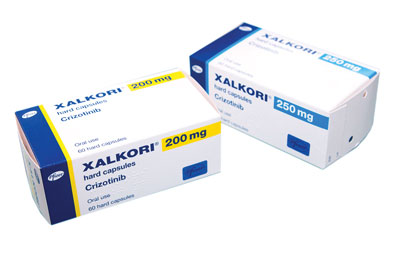Adcetris (brentuximab vedotin) vs Xalkori (crizotinib)
Adcetris (brentuximab vedotin) vs Xalkori (crizotinib)
Adcetris (brentuximab vedotin) is an antibody-drug conjugate specifically designed to treat certain types of lymphomas, including Hodgkin lymphoma and systemic anaplastic large cell lymphoma, by targeting the CD30 antigen on cancer cells. Xalkori (crizotinib), on the other hand, is a small molecule tyrosine kinase inhibitor used to treat non-small cell lung cancer (NSCLC) that is positive for the anaplastic lymphoma kinase (ALK) mutation or ROS1-positive advanced NSCLC. The choice between Adcetris and Xalkori would largely depend on the specific type of cancer a patient has, as they are targeted therapies designed for different cancer markers and are not interchangeable.
Difference between Adcetris and Xalkori
| Metric | Adcetris (brentuximab vedotin) | Xalkori (crizotinib) |
|---|---|---|
| Generic name | Brentuximab vedotin | Crizotinib |
| Indications | Hodgkin lymphoma, systemic anaplastic large cell lymphoma, primary cutaneous anaplastic large cell lymphoma, and certain types of mycosis fungoides | Non-small cell lung cancer (NSCLC) with specific genetic alterations (ALK or ROS1-positive), and anaplastic large-cell lymphoma |
| Mechanism of action | CD30-directed antibody-drug conjugate | ALK and ROS1 tyrosine kinase inhibitor |
| Brand names | Adcetris | Xalkori |
| Administrative route | Intravenous infusion | Oral |
| Side effects | Peripheral neuropathy, neutropenia, fatigue, nausea, anemia, upper respiratory tract infection, diarrhea, fever, rash, thrombocytopenia, cough, and vomiting | Visual disorders, gastrointestinal effects, edema, dizziness, neuropathy, elevated transaminases, fatigue, decreased appetite, upper respiratory infection, dysgeusia, and constipation |
| Contraindications | Hypersensitivity to brentuximab vedotin or any excipient | Hepatic impairment, QT interval prolongation, bradycardia, use of strong CYP3A inhibitors or inducers |
| Drug class | Antineoplastic agent, monoclonal antibody | Antineoplastic agent, tyrosine kinase inhibitor |
| Manufacturer | Seagen Inc. | Pfizer Inc. |
Efficacy
Adcetris (Brentuximab Vedotin) Efficacy in Lymphoma
Adcetris (brentuximab vedotin) is an antibody-drug conjugate specifically indicated for the treatment of several types of lymphoma. It is approved for use in classical Hodgkin lymphoma (HL) after failure of other treatments, such as autologous stem cell transplant (ASCT) or at least two prior multi-agent chemotherapy regimens in patients who are not ASCT candidates. It has also shown efficacy in systemic anaplastic large cell lymphoma (ALCL) and certain types of cutaneous T-cell lymphoma (CTCL). The efficacy of Adcetris in lymphoma is attributed to its mechanism of action, which involves targeting the CD30 antigen on lymphoma cells and delivering a potent cytotoxic agent, monomethyl auristatin E (MMAE), leading to cell death.
Clinical trials have demonstrated the efficacy of Adcetris in inducing complete and partial remissions in patients with relapsed or refractory HL and systemic ALCL. In pivotal trials, a significant proportion of patients achieved an objective response, with some experiencing durable remissions. The drug's effectiveness has led to its adoption as a key therapeutic agent in the management of these lymphomas, particularly for patients who have limited treatment options due to the refractory nature of their disease.
Xalkori (Crizotinib) Efficacy in Lymphoma
Xalkori (crizotinib) is primarily known for its use in the treatment of non-small cell lung cancer (NSCLC) with specific genetic alterations. However, its efficacy in lymphoma, particularly in ALK-positive anaplastic large cell lymphoma (ALCL), has been investigated due to its mechanism of action as an ALK inhibitor. ALK-positive ALCL is a subtype of non-Hodgkin lymphoma characterized by the presence of the ALK protein, which crizotinib targets. While Xalkori is not universally approved for lymphoma treatment, its off-label use in ALK-positive ALCL has been explored in clinical settings.
Early clinical studies and case reports suggest that crizotinib may have activity in patients with ALK-positive ALCL, with some patients achieving complete or partial responses. However, the evidence for its use in lymphoma is not as robust as for its approved indications, and further clinical trials are needed to fully establish its efficacy and safety profile in this patient population. As such, Xalkori's use in lymphoma remains investigational and is generally considered when other, more established treatment options are not suitable or have failed.
Regulatory Agency Approvals
Adcetris
-
European Medical Agency (EMA), European Union

-
Food and Drug Administration (FDA), USA

-
Health Canada

-
Pharmaceuticals and Medical Devices Agency (PMDA), Japan

-
Therapeutic Goods Administration (TGA), Australia

-
NMPA (China)

Xalkori
-
European Medical Agency (EMA), European Union

-
Food and Drug Administration (FDA), USA

-
Health Canada

-
Pharmaceuticals and Medical Devices Agency (PMDA), Japan

-
Therapeutic Goods Administration (TGA), Australia

Access Adcetris or Xalkori today
If Adcetris or Xalkori are not approved or available in your country (e.g. due to supply issues), you can access them via Everyone.org.
How it works

Make an enquiry
Choose the medicine you want to buy, answer a couple of questions, and upload your prescription to speed things up. We’ll get back to you within 24 hours.


Make an enquiry
Choose the medicine you want to buy, answer a couple of questions, and upload your prescription to speed things up. We’ll get back to you within 24 hours.


Breeze through the paperwork
We'll guide you through the required documents for importing unapproved medicine, ensuring you have all the necessary information.


Get a personalized quote
We’ll prepare a quote for you, including medicine costs and any shipping, administrative, or import fees that may apply.


Receive your medicine
Accept the quote and we’ll handle the rest - sourcing and safely delivering your medicine.

Some text on this page has been automatically generated. Speak to your physician before you start a new treatment or medication.
Let's talk
If you have any questions, call us or send us a message through WhatsApp or email:
Contact us




